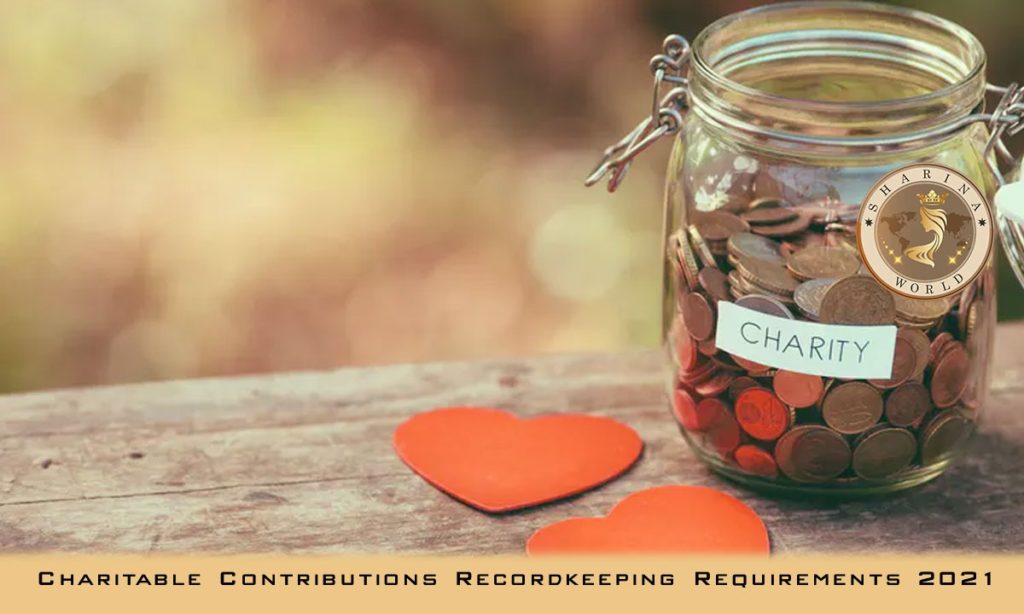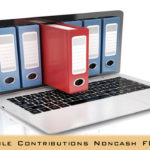Recordkeeping Requirements
Recordkeeping Requirements for Charitable Contributions
Reporting Requirement Thresholds:
- Do not combine separate contributions.
- Combine claimed deductions of all similar items to determine $501 or greater amount.
Contribution: Less than $ 250 | |
Cash | One of the following: 1) Bank record with organization’s name, date, and amount of contribution. Bank records may include canceled check, bank statement, or credit card statement. 2) Receipt (includes email) showing organization’s name, date, and amount of contribution. 3) Payroll deduction record. |
Noncash | All of the following: 1) Receipt from a charitable organization showing the name of the organization, date and location of the contribution, and a reasonably detailed description of property contributed. 2) Documentation of FMV and method used to determine amount claimed, if less than your entire interest, and terms of any condition attached to the contribution. Note: A receipt is not required where it is impractical to get one, such as leaving property at a charity’s unattended drop site. The organization’s name, date of contribution, and description of property are still required. |
Contribution: $ 250 to $ 500 | |
Cash | Same as less than $250, plus: Written acknowledgement from the charitable organization or payroll deduction record. The acknowledgement must (1) show the date and amount of the contribution, (2) state whether any goods or services other than intangible religious benefits were provided by the charitable organization (including a good faith estimate of the value), and (3) a statement that the only benefit the taxpayer received was an intangible religious benefit, if that was the case. The taxpayer must receive the acknowledgement by the earlier of the date of filing or due date of the return, including extensions. |
Contribution: $ 250 to $ 500 (continued) | |
Noncash | Documentation as in 2), previous column, for less than $250 plus written acknowledgement from the charitable organization showing (1) the date and location of the contribution, (2) a reasonably detailed description of the contributed property, (3) whether any goods or services other than intangible religious benefits were provided by the charitable organization (including a good faith estimate of the value), and (4) a statement that the only benefit the taxpayer received was an intangible religious benefit, if that is the case. The written acknowledgement does not need to state fair market value. The taxpayer must receive the acknowledgement by the earlier of the date of filing or due date of the return, including extensions. |
Contribution: $ 501 to $ 5,000 | |
Cash | Same as $250 to $500. |
Noncash | Same as $250 to $500, plus: • How property was acquired (purchase, gift, inheritance, etc.). • Approximate date property was obtained or produced. • Cost or other basis and basis adjustments. If information about the date acquired or basis of the property is not available due to reasonable cause, attach an explanation to the return. |
Contribution: Over $ 5,000 | |
Cash | Same as $250 to $500. |
Noncash | Same as $250 to $5,000. A written appraisal is generally required. Certain exceptions exist for written appraisals including securities with readily available market quotations. |
Part Contribution, Part Goods or Services
A written statement from a charity is required if a donation is more than $75 and is partly a contribution and partly for goods or services. The statement must contain an estimate of the value of goods or services received.
Exception: A written statement for goods or services is not required if one of the following is true.
- The charity is a federal, state, or local government, or a religious organization where the benefit is an intangible religious benefit, such as admission to a religious
- The goods or services are of token
- The goods or services are membership
Out of Pocket and Auto Expenses
If you do volunteer work for charitable organizations you can deduct your out of pocket expenses. The expense must be incurred because of the services rendered. The value of your time to render the services is not deductible. Report out of pocket expenses as cash contributions.
- Auto expenses. Deductible out of pocket expenses include the cost of using your auto in providing services for a charitable Deduct the actual cost of gas and oil or the standard mileage rate. Add parking and tolls to amount claimed for either standard mileage rate or actual expenses.
- Charitable standard mileage rate. The charitable standard mileage rate for 2021 is 14¢ per mile.
- Travel The cost of travel, such as air, rail, and bus transportation, as well as meals and lodging, are deductible while away from home doing volunteer work if there is no significant element of personal pleasure, recreation, or vacation in the travel. The deduction will not be denied simply because you enjoy doing the volunteer work. However, if you have only nominal duties for the charity, or if for significant parts of the trip you do not have duties to perform, the travel expenses are not deductible.
- Travel expenses to attend a convention of a qualified organization are deductible only if you are a chosen representative. Expenses to attend a church convention, for example, are not deductible if you attend as a member of the church rather than as a chosen representative.
- The cost and upkeep of uniforms not suitable for everyday use are deductible if required to be worn while performing volunteer work for a charitable organization.
Form 8283, Noncash Charitable Contributions
Use Form 8283, Noncash Charitable Contributions, to report information about noncash contributions when the total amount exceeds $500.
Complete Section A, Form 8283 | Complete Section B, Form 8283 |
• Items or groups of similar items* for which a deduction of $5,000 or less per item is claimed. • Publicly traded securities, even if deduction exceeds $5,000. | • Items or groups of similar items* for which a deduction of more than $5,000 is claimed. • Most items reported in Section B require a written appraisal. |
* Similar items are items of the same generic category or type. For example, clothing and books are not similar.







